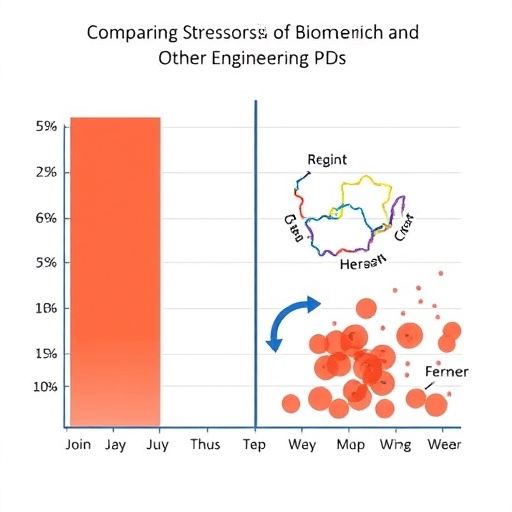
In the increasingly complex landscape of modern academia, particularly within the realm of engineering, researchers from renowned institutions have turned their attention to a pressing issue: the stressors faced by doctoral students. In a recent study, “Interdisciplinary Education,” âR&D,â and âContaminationâ: Comparing the Stressors of Biomedical Engineering Doctoral Students to Other Engineering Fields, published in Biomedical Engineering Education, authors Mirabelli, Cromley, and Jensen have delved into this critical topic. The researchers meticulously chart the unique challenges encountered by biomedical engineering students compared to their counterparts in other engineering disciplines.
The premise of the research stems from the observation that stress in academic environments, particularly for doctoral students, can significantly impact their mental health and academic performance. The researchers highlight that biomedical engineering, as a distinct interdisciplinary field, poses unique stressors that could be qualitatively different from those faced by traditional engineering disciplines. This study acts as a much-needed clarion call for universities to reevaluate the support structures available for these students.
Their work is grounded in a comprehensive analysis that examines the origins and types of stressors impacting students in various engineering domains. Notably, the researchers draw attention to the convergence of rigorous academic expectations and the emotional complexities inherent in the interdisciplinary nature of biomedical engineering. This field often requires collaboration across diverse scientific domains, and the researchers identify that this very collaboration can often introduce unique stressors that do not exist as prevalently in more traditional fields.
This comparative research employs both qualitative and quantitative methodologies, providing a robust framework for understanding the nuances of stress within biomedical engineering doctoral programs. Through a variety of tools, including surveys and interviews, the team gathered extensive data which they subsequently analyzed to extract meaningful insights into the stress experiences of these students. The empirical evidence presented illustrates the multifaceted nature of stress, ranging from workload and academic pressure to isolation and the need for interdisciplinary synergy.
Readers will find that Mirabelli, Cromley, and Jensen not only catalog these stressors but also draw critical comparisons to the experiences of engineering students in other fields. The findings suggest that while stress is a universal phenomenon in academic pursuits, its sources and manifestations can vary significantly across disciplines. The authors report that biomedical engineering students often experience increased anxiety related to funding opportunities, research and development pressures, and the inherent uncertainties associated with groundbreaking innovation.
In addition, the study highlights the phenomenon of “contamination”ânot just in the environmental sense, but as it relates to academic integrity and the ethical dilemmas faced within research and development. The authors argue that the intense ethical considerations in biomedical engineering add an extra layer of stress, as students grapple with the implications of their work on human health and safety. This aspect of the research opens up a broader discourse on how curricula across disciplines can better prepare students for the ethical challenges they will face in their careers.
The implications of these findings are profound, urging educators and administrators to look closely at the support systems available for doctoral students. The authors propose that institutions should develop tailored resources and strategies to mitigate these stressors. Suggestions include focused mentoring programs, mental health resources, and workshops on interdisciplinary collaboration skills, all of which could significantly enhance the academic experience for students.
Evaluating the short- and long-term effects of such stressors is vital not just for student well-being, but also for the integrity and innovation potential of the biomedical engineering field as a whole. By placing a spotlight on these issues, the study empowers institutions to take proactive steps in fostering a healthier, more supportive academic environment.
As the landscape of engineering education continues to evolve, this study serves as an essential roadmap in understanding the distinctive challenges posed to students engaged in interdisciplinary fields. With the increasing integration of technology, collaboration, and research that crosses traditional boundaries, a comprehensive effort to address these stressors will undoubtedly elevate the standards of education and research output in biomedical engineering.
Ultimately, this scholarly research calls for a paradigm shift, where the interplay between education, research, and mental health is given due consideration. As we pursue advancements in science and engineering, we must not overlook the human element driving that innovation. Mirabelli, Cromley, and Jensen present an incredibly timely and relevant inquiry into this relationship, reminding us that supporting the well-being of doctoral students is as crucial as advancing their academic achievements.
Subject of Research: Stressors faced by biomedical engineering doctoral students compared to other engineering fields.
Article Title: Interdisciplinary Education, “R&D,” and “Contamination”: Comparing the Stressors of Biomedical Engineering Doctoral Students to Other Engineering Fields.
Article References:
Mirabelli, J.F., Cromley, J.G. & Jensen, K.J. âInterdisciplinary Education,â âR&D,â and âContaminationâ: Comparing the Stressors of Biomedical Engineering Doctoral Students to Other Engineering Fields.
Biomed Eng Education 4, 211â223 (2024). https://doi.org/10.1007/s43683-024-00148-4
Image Credits: AI Generated
DOI: https://doi.org/10.1007/s43683-024-00148-4
Keywords: Stress, biomedical engineering, doctoral education, interdisciplinary collaboration, mental health.
Tags: academic pressure in engineeringbiomedical engineering challengescomparison of engineering disciplinesdoctoral student well-beingemotional complexities in PhD studiesimpact of stress on academic performanceinterdisciplinary education in engineeringmental health in doctoral educationresearch on engineering educationstressors faced by PhD studentssupport systems for engineering PhDsunique stressors in biomedical fields




